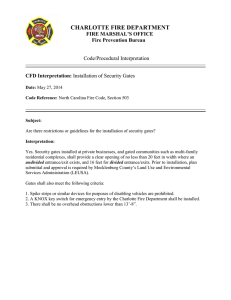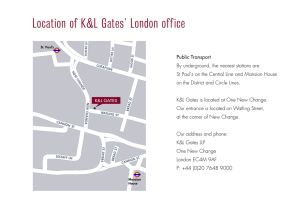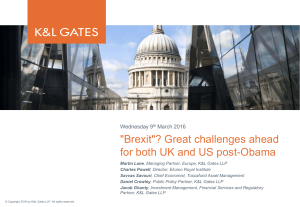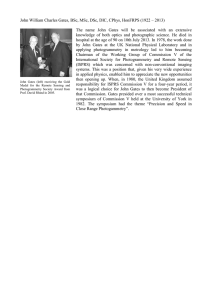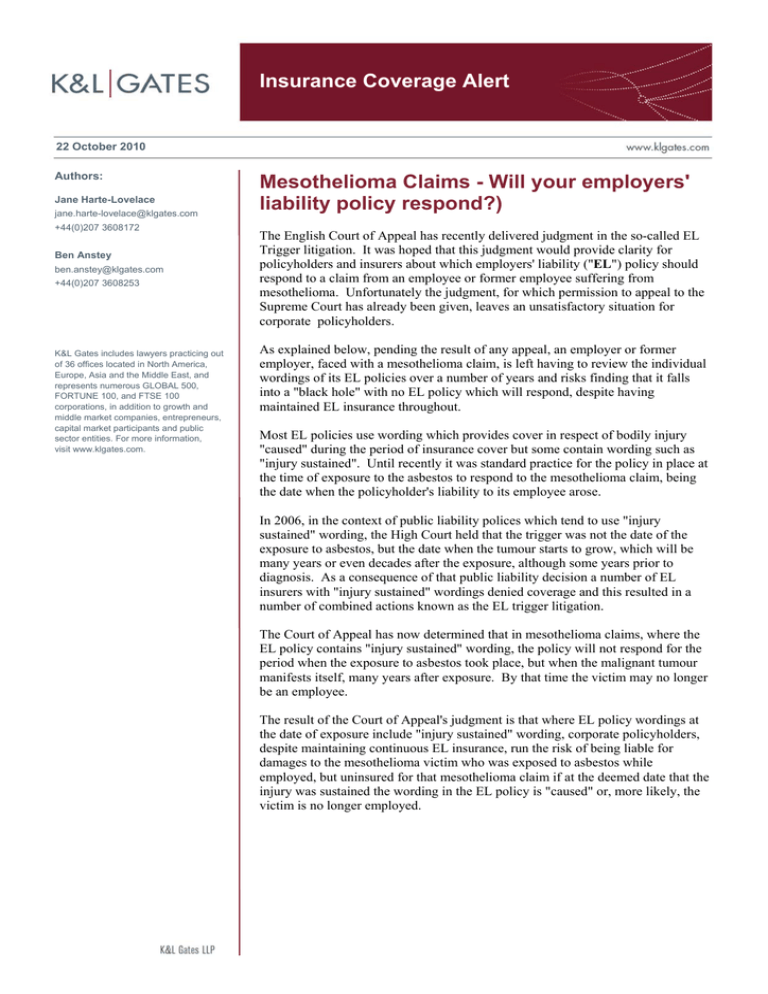
Insurance Coverage Alert
22 October 2010
Authors:
Jane Harte-Lovelace
jane.harte-lovelace@klgates.com
+44(0)207 3608172
Ben Anstey
ben.anstey@klgates.com
+44(0)207 3608253
K&L Gates includes lawyers practicing out
of 36 offices located in North America,
Europe, Asia and the Middle East, and
represents numerous GLOBAL 500,
FORTUNE 100, and FTSE 100
corporations, in addition to growth and
middle market companies, entrepreneurs,
capital market participants and public
sector entities. For more information,
visit www.klgates.com.
Mesothelioma Claims - Will your employers'
liability policy respond?)
The English Court of Appeal has recently delivered judgment in the so-called EL
Trigger litigation. It was hoped that this judgment would provide clarity for
policyholders and insurers about which employers' liability ("EL") policy should
respond to a claim from an employee or former employee suffering from
mesothelioma. Unfortunately the judgment, for which permission to appeal to the
Supreme Court has already been given, leaves an unsatisfactory situation for
corporate policyholders.
As explained below, pending the result of any appeal, an employer or former
employer, faced with a mesothelioma claim, is left having to review the individual
wordings of its EL policies over a number of years and risks finding that it falls
into a "black hole" with no EL policy which will respond, despite having
maintained EL insurance throughout.
Most EL policies use wording which provides cover in respect of bodily injury
"caused" during the period of insurance cover but some contain wording such as
"injury sustained". Until recently it was standard practice for the policy in place at
the time of exposure to the asbestos to respond to the mesothelioma claim, being
the date when the policyholder's liability to its employee arose.
In 2006, in the context of public liability polices which tend to use "injury
sustained" wording, the High Court held that the trigger was not the date of the
exposure to asbestos, but the date when the tumour starts to grow, which will be
many years or even decades after the exposure, although some years prior to
diagnosis. As a consequence of that public liability decision a number of EL
insurers with "injury sustained" wordings denied coverage and this resulted in a
number of combined actions known as the EL trigger litigation.
The Court of Appeal has now determined that in mesothelioma claims, where the
EL policy contains "injury sustained" wording, the policy will not respond for the
period when the exposure to asbestos took place, but when the malignant tumour
manifests itself, many years after exposure. By that time the victim may no longer
be an employee.
The result of the Court of Appeal's judgment is that where EL policy wordings at
the date of exposure include "injury sustained" wording, corporate policyholders,
despite maintaining continuous EL insurance, run the risk of being liable for
damages to the mesothelioma victim who was exposed to asbestos while
employed, but uninsured for that mesothelioma claim if at the deemed date that the
injury was sustained the wording in the EL policy is "caused" or, more likely, the
victim is no longer employed.
Insurance Coverage Alert
This can have serious consequences for
organisations which own or have owned English
companies or operations, particularly industrial
companies which operated in the 1960s, in which
employees may have been exposed to asbestos.
Those companies may be liable to pay damages
to the employee, but will not necessarily have
insurance coverage for those claims unless they
have had the "caused" wording in their EL
policies at the time of alleged exposure. Thus
organisations may have significant unrecognised
contingent liabilities for mesothelioma claims for
which provision may need to be made.
The judgment makes it all the more important to
gather or maintain records of the employment and
insurance history of all companies in the group,
going back many decades, and to check the
wording of the relevant EL policies to assess
whether there may be any uninsured contingent
liabilities.
Companies planning acquisitions involving
organisations which have operated in the UK,
particularly those involved in heavy industry
now or in the past, should take particular care
during due diligence to avoid acquiring
unexpected liabilities.
Should you have any queries you wish to discuss
further, please contact Jane Harte-Lovelace on
telephone number +44(0)207 3608172, or Ben
Anstey on +44(0)207 3608253, in our London
office.
Anchorage Austin Beijing Berlin Boston Charlotte Chicago Dallas Dubai Fort Worth Frankfurt Harrisburg Hong Kong London
Los Angeles Miami Moscow Newark New York Orange County Palo Alto Paris Pittsburgh Portland Raleigh Research Triangle Park
San Diego San Francisco Seattle Shanghai Singapore Spokane/Coeur d’Alene Taipei Tokyo Warsaw Washington, D.C.
K&L Gates includes lawyers practicing out of 36 offices located in North America, Europe, Asia and the Middle East, and represents numerous
GLOBAL 500, FORTUNE 100, and FTSE 100 corporations, in addition to growth and middle market companies, entrepreneurs, capital market
participants and public sector entities. For more information, visit www.klgates.com.
K&L Gates comprises multiple affiliated entities: a limited liability partnership with the full name K&L Gates LLP qualified in Delaware and
maintaining offices throughout the United States, in Berlin and Frankfurt, Germany, in Beijing (K&L Gates LLP Beijing Representative Office),
in Dubai, U.A.E., in Shanghai (K&L Gates LLP Shanghai Representative Office), in Tokyo, and in Singapore; a limited liability partnership (also
named K&L Gates LLP) incorporated in England and maintaining offices in London and Paris; a Taiwan general partnership (K&L Gates)
maintaining an office in Taipei; a Hong Kong general partnership (K&L Gates, Solicitors) maintaining an office in Hong Kong; a Polish limited
partnership (K&L Gates Jamka sp.k.) maintaining an office in Warsaw; and a Delaware limited liability company (K&L Gates Holdings, LLC)
maintaining an office in Moscow. K&L Gates maintains appropriate registrations in the jurisdictions in which its offices are located. A list of the
partners or members in each entity is available for inspection at any K&L Gates office.
This publication is for informational purposes and does not contain or convey legal advice. The information herein should not be used or relied
upon in regard to any particular facts or circumstances without first consulting a lawyer.
©2010 K&L Gates LLP. All Rights Reserved.
22 October 2010
2



